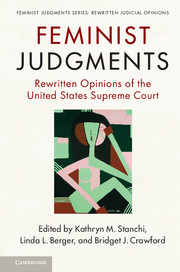Book contents
- Frontmatter
- Dedication
- Contents
- Notes on contributors
- Advisory panel
- Preface
- Acknowledgments
- About the cover art
- Table of cases
- Part I Introduction and overview
- 1 Introduction to the U.S. feminist judgments project
- 2 Talking back: From feminist history and theory to feminist legal methods and judgments
- Part II The feminist judgments
- Index
2 - Talking back: From feminist history and theory to feminist legal methods and judgments
from Part I - Introduction and overview
Published online by Cambridge University Press: 05 August 2016
- Frontmatter
- Dedication
- Contents
- Notes on contributors
- Advisory panel
- Preface
- Acknowledgments
- About the cover art
- Table of cases
- Part I Introduction and overview
- 1 Introduction to the U.S. feminist judgments project
- 2 Talking back: From feminist history and theory to feminist legal methods and judgments
- Part II The feminist judgments
- Index
Summary
INTRODUCTION
Not all women or people of color, in all or some circumstances or indeed in any particular case or circumstance but enough people of color in enough cases, will make a difference in the process of judging … I would hope that a wise Latina woman with the richness of her experience would more often than not reach a better conclusion than a white male who hasn't lived that life.
Perspective, context, and experience are relevant to judging. That is the essence of the Feminist Judgments Project and of these observations by Justice Sonia Sotomayor, the third of only four women and the only woman of color ever appointed to the U.S. Supreme Court. And while feminist judging will likely have its most obvious impact on exposing and eradicating women's subordination, as is evident from Justice Sotomayor's statement, women are multidimensional. Thus, the core goal of the Feminist Judgments Project is to dismantle hierarchies, no matter whether they are based on gender, sex, sexuality, race, ethnicity, class, religion, nationality, language, culture, or ability.
This chapter provides background on and context for three important elements of the Feminist Judgments Project: history, theory, and method. It traces the historical and cultural contexts within which the feminist movements emerged and evolved, and it presents the development of feminist theoretical frameworks and feminist methods. To explore women's judging, the chapter chronicles the appointment of women to the federal judiciary and reviews studies about the impact of women's presence on the bench. Finally, considering the purpose of the project, as prelude to the reconstructed judgments, the chapter explores the questions of what it takes to judge, what makes a judgment feminist, and what difference feminist judging might make in the process or outcome of cases.
Multiple feminist perspectives, based on divergent philosophies, have led to a resistance to adopting any one definition of feminism. Feminism may be defined in multiple ways: as the “ideology of women's liberation,” as “an analysis of women's subordination for the purpose of figuring out how to change it,” and as “a critical social practice directed toward better understanding and improving the position of women in diverse social locations.”
- Type
- Chapter
- Information
- Feminist JudgmentsRewritten Opinions of the United States Supreme Court, pp. 24 - 52Publisher: Cambridge University PressPrint publication year: 2016
- 1
- Cited by



